NL Recommendations
At Natural Lifemanship, we often get asked to share tools, books, products and ideas that have influenced the principles of Natural Lifemanship and support practicing the principles with clients, equine partners and ourselves.
Here you’ll find a carefully curated collection of resources we trust and wholeheartedly believe in. Some are created by our team at Natural Lifemanship, while others come from colleagues or organizations we admire and collaborate with.
While we have affiliate relationships with some (see disclosure below), we will only ever recommend resources that align with our values and mission to facilitate connection, growth, and healing through experiential and relational practices.
- All
- Books w/ NL Contributions
- Attachment
- Child/Parenting
- Embodiment/Somatics
- Nature-based
- Neuroscience
- Personal Accounts/Nonfiction
- Professional Development




















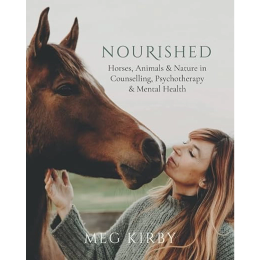
Nourished: Horses, Animals & Nature in Counselling, Psychotherapy and Mental Health
In Nourished, international educational experts and mental health professionals across a wide range of disciplines share how horses, animals and nature can be incorporated in counselling, psychotherapy, mental health treatment and personal development.
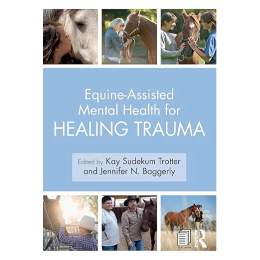
Equine Assisted Mental Health for Healing Trauma
Clinicians have long recognized that trauma therapy provides a pathway to recovery, and Equine-Assisted Mental Health for Healing Trauma provides that pathway for those who work with horses and clients together. This book demonstrates a range of equine-assisted mental health approaches and step-by-step strategies for facilitating recovery from trauma for children, adults, and families. Chapters address topics such as chronic childhood trauma, accident-related trauma, complex trauma and dissociation, posttraumatic growth in combat veterans, somatic experiencing and attachment, eye movement desensitization and reprocessing (EMDR), reactive attachment disorder (RAD), relational trauma, and sexual trauma. Experts also provide case studies accompanied by transcript analyses to demonstrate the process of trauma healing. Clinicians will come away from the book with a wealth of theoretical and practical skills and an in-depth, trauma-informed understanding that they can use directly in their work with clients.
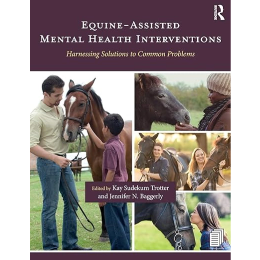
Equine-Assisted Mental Health Interventions: Harnessing Solutions to Common Problems
Written by internationally renowned equine-assisted mental health professionals, this edited collection teaches counselors how to design and implement equine-assisted mental health interventions for different populations and various challenges. Supported by ethical considerations and theoretical frameworks, chapters cover common issues including depression, anxiety, grief, ADHD, autism, eating disorders, substance abuse, self-esteem, social skills and communication, couples and family work, and professional development. Each chapter provides practical tips for implementing treatment strategies, case studies with transcript analyses, and sample session notes. This book will appeal to both the expert equine-assisted mental health counselor and the seasoned counselor who is open to partnering with an equine practitioner to help their clients in new and innovative ways.

Attachment Disturbances in Adults: Treatment for Comprehensive Repair
A comprehensive treatment approach for the repair and resolution of attachment disturbances in adults, for use in clinical settings.
With contributions by Paula Morgan-Johnson, Paula Sacks, Caroline R. Baltzer, James Hickey, Andrea Cole, Jan Bloom, and Deirdre Fay.
Attachment Disturbances in Adults is a landmark resource for (1) understanding attachment, its development, and the most clinically relevant findings from attachment research, and (2) using this understanding to inform systematic, comprehensive, and clinically effective and efficient treatment of attachment disturbances in adults.
It offers an innovative therapeutic model and set of methods for treating adult patients with dismissing, anxious-preoccupied, or disorganized attachment. In rich detail, it integrates historical and leading-edge attachment research into practical, effective treatment protocols for each type of insecure attachment. Case transcripts and many sample therapist phrasings illustrate how to apply the methods in practice.
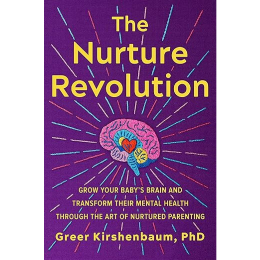
The Nurture Revolution: Grow Your Baby's Brain and Transform Their Mental Health through the Art of Nurtured Parenting
The latest research in neuroscience and parenting come together in this groundbreaking book, which brings to light new realizations about the power of nurture for our children’s mental and physical health outcomes.
Greer Kirshenbaum, PhD. is a neuroscientist, doula, and parent. Her work began with the goal of developing new treatments for poor mental health; she dreamed of creating a new medication to address conditions like anxiety, depression, addiction, and chronic stress. Over time, she realized that science had already uncovered a powerful medicine for alleviating mental health struggles, but the answer wasn’t a pill. It was a preventative approach: when babies’ receive nurturing care in the first three years of life, it builds strong, resilient brains — brains that are less susceptible to poor mental health.
How can parents best set their children up for success? In this revelatory book, Dr. Kirshenbaum makes plain that nurture is a preventative medicine against mental health issues. She challenges the idea that the way to cultivate independence is through letting babies cry it out or sleep alone; instead, the way to raise a confident, securely attached child is to lean in to nurture, to hold your infant as much as you want, support their emotions, engage in back-and-forth conversations, be present and compassionate when your baby is stressed, and share sleep. Research has proven that nurturing experiences transform lives. Nurturing is a gift of resilience and health parents can give the next generation simply by following their instincts to care for their young.
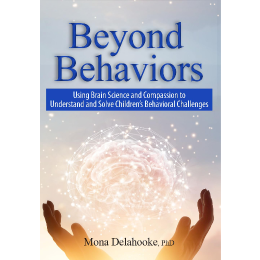
Beyond Behaviors: Using Brain Science and Compassion to Understand and Solve Children's Behavioral Challenges
A NEW approach to solving behavioral challenges.
In Beyond Behaviors, internationally known pediatric psychologist, Dr. Mona Delahooke describes behaviors as the tip of the iceberg, important signals that we should address by seeking to understand a child’s individual differences in the context of relational safety.
Featuring impactful worksheets and charts, this accessible book offers professionals, educators and parents tools and techniques to reduce behavioral challenges and promote psychological resilience and satisfying, secure relationships.
Neuroscience-based effective tools and strategies for children labeled with:
– Conduct Disorder
– Oppositional Defiant Disorder (ODD)
– Disruptive Mood Dysregulation Disorder (DMDD)
– Reactive Attachment Disorder (RAD)
– Sensory Processing Disorder (SPD)
– Anxiety & Depression
– Autism & Developmental or Learning Differences
And children who experience or have experienced:
– Aggressive, confusing and unpredictable behaviors
– Tantrums and meltdowns
– Disconnection or shutdown
– Adverse childhood experiences
– Trauma and toxic stress
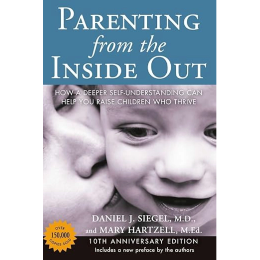
Parenting from the Inside Out: How a Deeper Self-Understanding Can Help You Raise Children Who Thrive: 10th Anniversary Edition
An updated edition—with a new preface—of the bestselling parenting classic by the author of “BRAINSTORM: The Power and Purpose of the Teenage Brain”
In Parenting from the Inside Out, child psychiatrist Daniel J. Siegel, M.D., and early childhood expert Mary Hartzell, M.Ed., explore the extent to which our childhood experiences shape the way we parent. Drawing on stunning new findings in neurobiology and attachment research, they explain how interpersonal relationships directly impact the development of the brain, and offer parents a step-by-step approach to forming a deeper understanding of their own life stories, which will help them raise compassionate and resilient children.
Born out of a series of parents’ workshops that combined Siegel’s cutting-edge research on how communication impacts brain development with Hartzell’s decades of experience as a child-development specialist and parent educator, this book guides parents through creating the necessary foundations for loving and secure relationships with their children.
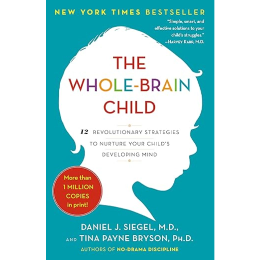
The Whole-Brain Child: 12 Revolutionary Strategies to Nurture Your Child's Developing Mind
In this pioneering, practical book, Daniel J. Siegel, neuropsychiatrist and author of the bestselling Mindsight, and parenting expert Tina Payne Bryson offer a revolutionary approach to child rearing with twelve key strategies that foster healthy brain development, leading to calmer, happier children. The authors explain—and make accessible—the new science of how a child’s brain is wired and how it matures. The “upstairs brain,” which makes decisions and balances emotions, is under construction until the mid-twenties. And especially in young children, the right brain and its emotions tend to rule over the logic of the left brain. No wonder kids throw tantrums, fight, or sulk in silence. By applying these discoveries to everyday parenting, you can turn any outburst, argument, or fear into a chance to integrate your child’s brain and foster vital growth.
Complete with age-appropriate strategies for dealing with day-to-day struggles and illustrations that will help you explain these concepts to your child, The Whole-Brain Child shows you how to cultivate healthy emotional and intellectual development so that your children can lead balanced, meaningful, and connected lives.
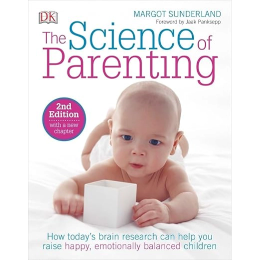
The Science of Parenting: How Today’s Brain Research Can Help You Raise Happy, Emotionally Balanced Childr
Backed by the most up-to-date scientific research, The Science of Parenting, 2nd Edition provides evidence-based parenting advice about how you should care for your child, with practical strategies from birth to 12 years of age. Child psychotherapist Dr. Margot Sunderland has more than 30 years’ experience that she brings to this internationally-acclaimed guide, and she provides numerous case studies to relate the science to real life.
From separations and time apart to forms of discipline to the latest thinking on screen time, this guide traces the direct effect of different parenting practices on your child’s brain. Summaries at the end of every chapter provide key takeaways and make action points simple and clear so you can begin to implement them immediately.
As a professional who works with families, Dr. Sunderland is attuned to the struggle of parents juggling lives at work and at home. This second edition of The Science of Parenting provides newly added, invaluable advice on making the most of your time with your child, so that you can forge a strong bond and have a positive relationship.
The Science of Parenting remains the greatest work on what science can teach us about parenting and the remarkable effects of love, nurture, and play on a child’s development.
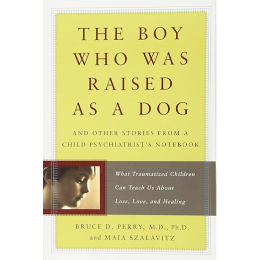
The Boy Who Was Raised as a Dog: And Other Stories from a Child Psychiatrist's Notebook
How does trauma affect a child’s mind—and how can that mind recover?
Child psychiatrist Dr. Bruce D. Perry has helped children faced with unimaginable horror: genocide survivors, murder witnesses, kidnapped teenagers, and victims of family violence. In the classic The Boy Who Was Raised as a Dog, Dr. Perry tells their stories of trauma and transformation and shares their lessons of courage, humanity, and hope. Deftly combining unforgettable case histories with his own compassionate, insightful strategies for rehabilitation, Perry explains what happens to children’s brains when they are exposed to extreme stress—and reveals the unexpected measures that can be taken to ease such pain and help them grow into healthy adults. Only when we understand the science of the mind and the power of love and nurturing can we hope to heal the spirit of even the most wounded child.
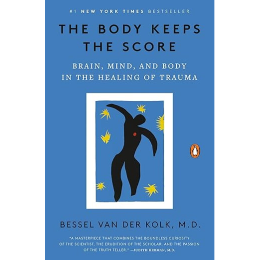
The Body Keeps the Score: Brain, Mind, and Body in the Healing of Trauma
Trauma is a fact of life. Veterans and their families deal with the painful aftermath of combat; one in five Americans has been molested; one in four grew up with alcoholics; one in three couples have engaged in physical violence. Dr. Bessel van der Kolk, one of the world’s foremost experts on trauma, has spent over three decades working with survivors. In The Body Keeps the Score, he uses recent scientific advances to show how trauma literally reshapes both body and brain, compromising sufferers’ capacities for pleasure, engagement, self-control, and trust. He explores innovative treatments—from neurofeedback and meditation to sports, drama, and yoga—that offer new paths to recovery by activating the brain’s natural neuroplasticity. Based on Dr. van der Kolk’s own research and that of other leading specialists, The Body Keeps the Score exposes the tremendous power of our relationships both to hurt and to heal—and offers new hope for reclaiming lives.
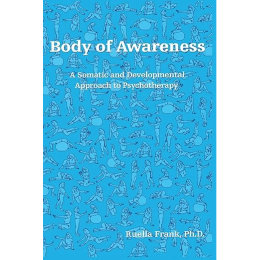
Body of Awareness: A Somatic and Developmental Approach to Psychotherapy
Merging scientific theory with a practical, clinical approach, Body of Awareness explores the formation of infant movement experience and its manifest influence upon the later adult. Most significantly, it shows how the organizing principles in early development are functionally equivalent to those of the adult. It demonstrates how movement plays a critical role in a developing self-awareness for the infant and in maintaining a healthy self throughout life. In addition, a variety of case studies illustrates how infant developmental movement patterns are part of the moment-to-moment processes of the adult client and how to bring these patterns to awareness within therapy.
Body of Awareness is intended to help therapists, new or advanced, to enhance their skills of attunement. They can do this by heightening their observations of subtle movement patterns as they emerge within the client/therapist relationship, and by respective their own developing feelings within session as essential information to the therapy process. And as developmental patterns are central to psychological functioning, a background study of movement provides the therapist with critical insight into the unfolding psychodynamic field.
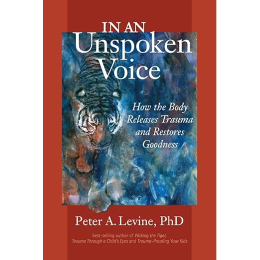
In an Unspoken Voice: How the Body Releases Trauma and Restores Goodness
In this culmination of his life’s work, Peter A. Levine draws on his broad experience as a clinician, a student of comparative brain research, a stress scientist and a keen observer of the naturalistic animal world to explain the nature and transformation of trauma in the body, brain and psyche. In an Unspoken Voice is based on the idea that trauma is neither a disease nor a disorder, but rather an injury caused by fright, helplessness and loss that can be healed by engaging our innate capacity to self-regulate high states of arousal and intense emotions. Enriched with a coherent theoretical framework and compelling case examples, the book elegantly blends the latest findings in biology, neuroscience and body-oriented psychotherapy to show that when we bring together animal instinct and reason, we can become more whole human beings.

The Pocket Guide to the Polyvagal Theory: The Transformative Power of Feeling Safe
When The Polyvagal Theory was published in 2011, it took the therapeutic world by storm, bringing Stephen Porges’s insights about the autonomic nervous system to a clinical audience interested in understanding trauma, anxiety, depression and other mental health issues. The book made accessible to clinicians and other professionals a polyvagal perspective that provided new concepts and insights for understanding human behavior. The perspective placed an emphasis on the important link between psychological experiences and physical manifestations in the body. That book was brilliant but also quite challenging to read for some.
Since publication of that book, Stephen Porges has been urged to make these ideas more accessible and The Pocket Guide to the Polyvagal Theory is the result. Constructs and concepts embedded in polyvagal theory are explained conversationally in The Pocket Guide and there is an introductory chapter which discusses the science and the scientific culture in which polyvagal theory was originally developed. Publication of this work enables Stephen Porges to expand the meaning and clinical relevance of this groundbreaking theory. —
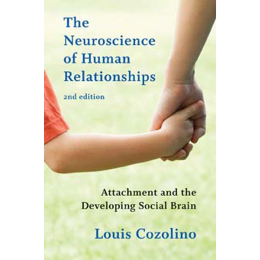
The Neuroscience of Human Relationships: Attachment and the Developing Social Brain
As human beings, we cherish our individuality yet we know that we live in constant relationship to others, and that other people play a significant part in regulating our emotional and social behavior. Although this interdependence is a reality of our existence, we are just beginning to understand that we have evolved as social creatures with interwoven brains and biologies. The human brain itself is a social organ and to truly understand being human, we must understand not only how we as whole people exist with others, but how our brains, themselves, exist in relationship to other brains.
The first edition of this book tackled these important questions of interpersonal neurobiology―that the brain is a social organ built through experience―using poignant case examples from the author’s years of clinical experience. Brain drawings and elegant explanations of social neuroscience wove together emerging findings from the research literature to bring neuroscience to the stories of our lives.
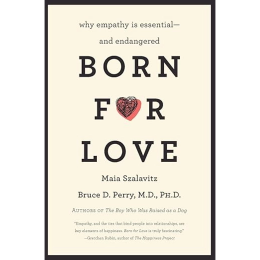
Born for Love: Why Empathy Is Essential--and Endangered
The groundbreaking exploration of the power of empathy by renowned child-psychiatrist Bruce D. Perry, coauthor, with Oprah Winfrey, of What Happened to You?
“Empathy, and the ties that bind people into relationships, are key elements of happiness. Born for Love is truly fascinating.” — Gretchen Rubin, #1 New York Times bestselling author of The Happiness Project
From birth, when babies’ fingers instinctively cling to those of adults, their bodies and brains seek an intimate connection, a bond made possible by empathy—the ability to love and to share the feelings of others.
In this provocative book, psychiatrist Bruce D. Perry and award-winning science journalist Maia Szalavitz interweave research and stories from Perry’s practice with cutting-edge scientific studies and historical examples to explain how empathy develops, why it is essential for our development into healthy adults, and how to raise kids with empathy while navigating threats from technological change and other forces in the modern world.
Perry and Szalavitz show that compassion underlies the qualities that make society work—trust, altruism, collaboration, love, charity—and how difficulties related to empathy are key factors in social problems such as war, crime, racism, and mental illness. Even physical health, from infectious diseases to heart attacks, is deeply affected by our human connections to one another.
As Born for Love reveals, recent changes in technology, child-rearing practices, education, and lifestyles are starting to rob children of necessary human contact and deep relationships—the essential foundation for empathy and a caring, healthy society. Sounding an important warning bell, Born for Love offers practical ideas for combating the negative influences of modern life and fostering positive social change to benefit us all. It reveals how and why the brain learns to bond with others—and is a stirring call to protect our children from new threats to their capacity to love.

IntraConnected: MWe (Me + We) as the Integration of Self, Identity, and Belonging (Norton Series on Interpersonal Neurobiology)
Exploring the nature of how our experience of what we call “self” emerges across the lifespan.
Both a personal and general meditation on identity and belonging, Daniel J. Siegel’s book combines personal reflections with scientific discussions of how the mind, brain, and our relationships shape who we are. Weaving the internal and external, the subjective and objective, IntraConnected reveals how our culture may give us a message of separation as a solo, isolated self, but a wider perspective unveils that who we are may be something more―broader than the brain, bigger even than the body―and fundamental to social systems and the natural world.
Our body-based self―the origin of a Me―is not only connected to others but connected within our relational worlds themselves―a WE―forming the essence of how we belong and our identity. If the pandemic has taught us nothing else, it has taught us that we are all connected. IntraConnected discusses that bond, as well as other realities of our intraconnected lives.
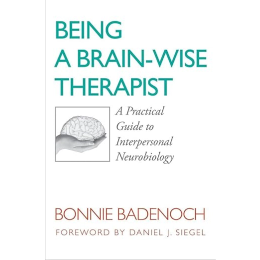
Being a Brain-Wise Therapist: A Practical Guide to Interpersonal Neurobiology (Norton Series on Interpersonal Neurobiology)
This book, part of the acclaimed Norton Series on Interpersonal Neurobiology, brings interpersonal neurobiology into the counseling room, weaving the concepts of neurobiology into the ever-changing flow of therapy.
Neuroscientific discoveries have begun to illuminate the workings of the active brain in intricate detail. In fact, sometimes it seems that in order to be a cutting-edge therapist, not only do you need knowledge of traditional psychotherapeutic models, but a solid understanding of the role the brain plays as well. But theory is never enough. You also need to know how to apply the theories to work with actual clients during sessions.
In easy-to-understand prose, Being a Brain-Wise Therapist reviews the basic principles about brain structure, function, and development, and explains the neurobiological correlates of some familiar diagnostic categories. You will learn how to make theory come to life in the midst of clinical work, so that the principles of interpersonal neurobiology can be applied to a range of patients and issues, such as couples, teens, and children, and those dealing with depression, anxiety, and other disorders. Liberal use of exercises and case histories enliven the material and make this an essential guide for seamlessly integrating the latest neuroscientific research into your therapeutic practice.
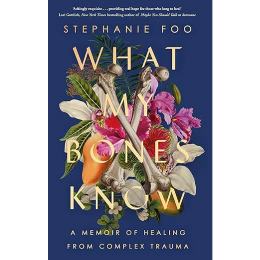
What My Bones Know
Every cell in my body is filled with the code of generations of trauma, of death, of birth, of migration, of history that I cannot understand. . . . I want to have words for what my bones know.By the age of thirty, Stephanie Foo was successful on she had her dream job as an award-winning radio producer at This American Life and a loving boyfriend. But behind her office door, she was having panic attacks and sobbing at her desk every morning. After years of questioning what was wrong with herself, she was diagnosed with complex PTSD – a condition that occurs when trauma happens continuously, over the course of years.Both of Foo’s parents abandoned her when she was a teenager, after years of physical and verbal abuse and neglect. She thought she’d moved on, but her new diagnosis illuminated the way her past continued to threaten her health, relationships, and career. She found limited resources to help her, so Foo set out to heal herself, and to map her experiences onto the scarce literature about C-PTSD.In this deeply personal and thoroughly researched account, Foo interviews scientists and psychologists and tries a variety of innovative therapies. She returns to her hometown in California to investigate the effects of immigrant trauma on the community, and she uncovers family secrets in the country of her birth, Malaysia, to learn how trauma can be inherited through generations. Ultimately, she discovers that you don’t move on from trauma – but you can learn to move with it.Powerful, enlightening and hopeful, What My Bones Know is a brave narrative that reckons with the hold of the past over the present, the mind over the body – and examines one woman’s ability to reclaim agency from her trauma.
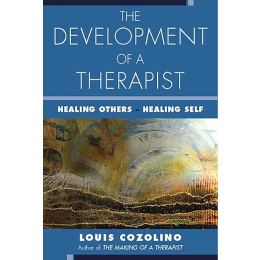
The Development of a Therapist: Healing Others - Healing Self (The Norton Series on Interpersonal Neurobiology)
A conversational and practical guide to the next level of professional development.
Louis Cozolino, one of our most compelling clinical writers, takes us inside the mind and heart of a seasoned therapist, carrying on the tradition of personal and professional writing begun in The Making of a Therapist. This book discusses some of the more abstract concepts and ways of interacting with clients such as relaxed curiosity, finding the secret ally, and discovering the deep narrative. Also addressed are clinical concepts such as related states of mind, the process of change, free-floating attention, and listening with the third ear.
More than just theoretical commentary, the book offers concrete clinical advice for the experienced therapist and brings a fresh perspective to some of the most current clinical challenges including the complexities of executive functioning; treating clients with internet addiction; and taking responsibility for your continued personal growth, clinical supervision, and education after leaving school.
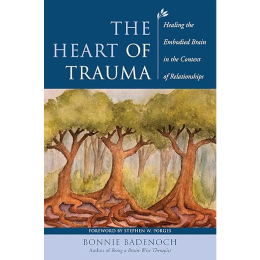
The Heart of Trauma: Healing the Embodied Brain in the Context of Relationships (Norton Series on Interpersonal Neurobiology)
How each of us can become a therapeutic presence in the world.
Images and sounds of war, natural disasters, and human-made devastation explicitly surround us and implicitly leave their imprint in our muscles, our belly and heart, our nervous systems, and the brains in our skulls. We each experience more digital data than we are capable of processing in a day, and this is leading to a loss of empathy and human contact. This loss of leisurely, sustained, face-to-face connection is making true presence a rare experience for many of us, and is neurally ingraining fast pace and split attention as the norm.
Yet despite all of this, the ability to offer the safe sanctuary of presence is central to effective clinical treatment of trauma and indeed to all of therapeutic practice. It is our challenge to remain present within our culture, Badenoch argues, no matter how difficult this might be. She makes the case that we are built to seek out, enter, and sustain warm relationships, all this connection will allow us to support the emergence of a humane world.
In this book, Bonnie Badenoch, a gifted translator of neuroscientific concepts into human terms, offers readers brain- and body-based insights into how we can form deep relational encounters with our clients and our selves and how relational neuroscience can teach us about the astonishing ways we are interwoven with one another. How we walk about in our daily lives will touch everyone, often below the level of conscious awareness.
The first part of The Heart of Trauma provides readers with an extended understanding of the ways in which our physical bodies are implicated in our conscious and non-conscious experience. Badenoch then delves even deeper into the clinical implications of moving through the world. She presents a strong, scientifically grounded case for doing the work of opening to hemispheric balance and relational deepening.


